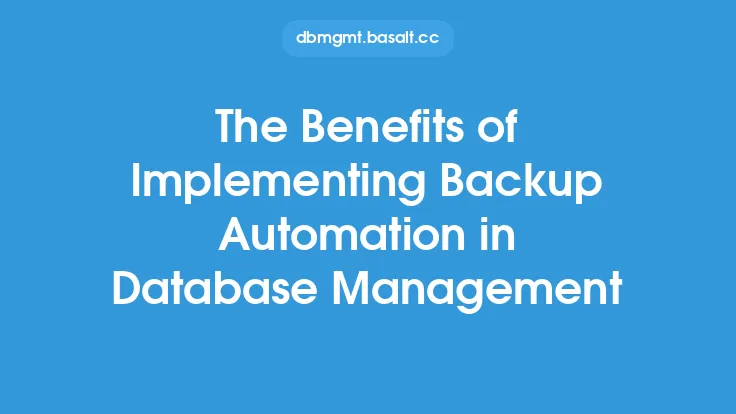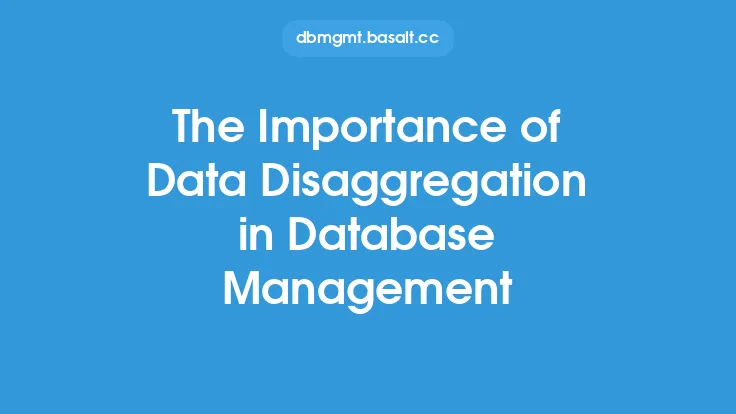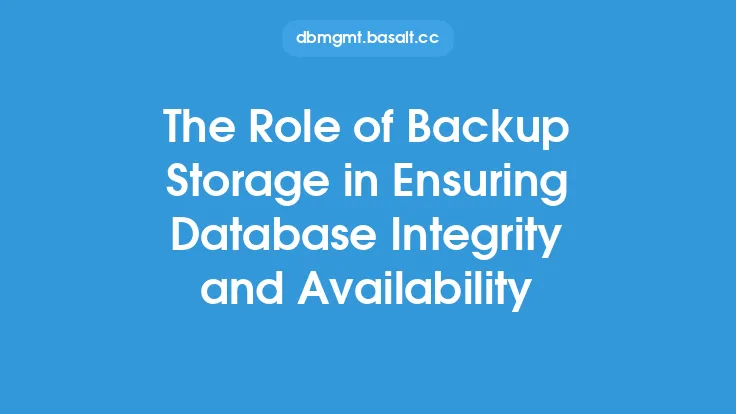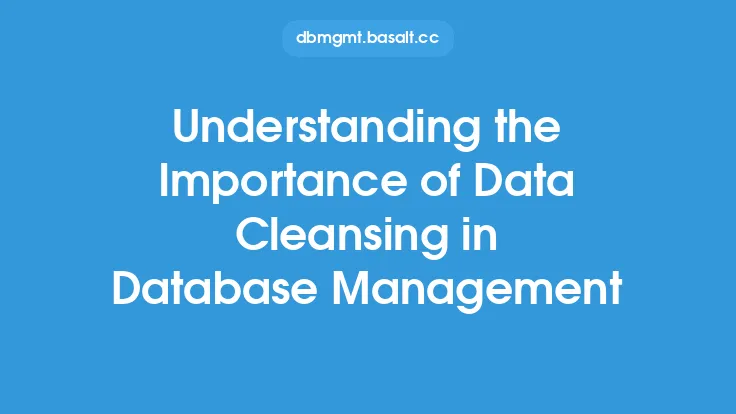In the realm of database management, data is the lifeblood that drives businesses forward. As databases grow in size and complexity, the importance of having a robust backup storage system in place cannot be overstated. Scalable backup storage is essential for ensuring that data is protected, readily available, and can be easily recovered in the event of a disaster or data loss. In this article, we will delve into the world of scalable backup storage, exploring its significance, key characteristics, and the benefits it offers to database administrators and organizations as a whole.
Introduction to Scalable Backup Storage
Scalable backup storage refers to a backup system that can grow and adapt to the evolving needs of an organization's database. It is designed to handle increasing amounts of data, user activity, and transactional volume without compromising performance or data integrity. A scalable backup storage system is capable of expanding its capacity, either by adding more storage devices or by leveraging cloud-based storage solutions, to keep pace with the growing demands of the database. This scalability is crucial for maintaining data availability, reducing downtime, and ensuring business continuity.
Key Characteristics of Scalable Backup Storage
Several key characteristics define a scalable backup storage system. First and foremost, it must be able to handle large volumes of data and scale up or down as needed. This scalability can be achieved through the use of distributed storage systems, where data is spread across multiple storage devices or nodes, allowing for easy expansion and contraction of storage capacity. Another important characteristic is high-performance data transfer, which enables fast backup and recovery operations. This is particularly critical in databases with high transactional volumes, where every minute of downtime can result in significant financial losses. Additionally, a scalable backup storage system should offer advanced data management features, such as data deduplication, compression, and encryption, to optimize storage capacity and ensure data security.
Benefits of Scalable Backup Storage
The benefits of implementing a scalable backup storage system are numerous and far-reaching. One of the most significant advantages is improved data availability. With a scalable backup storage system in place, database administrators can rest assured that data is always available and can be quickly recovered in the event of a disaster or data loss. This, in turn, leads to increased business continuity and reduced downtime, which can have a major impact on an organization's bottom line. Scalable backup storage also offers enhanced data protection, as it allows for multiple copies of data to be stored in different locations, reducing the risk of data loss due to hardware failure, software corruption, or other disasters. Furthermore, a scalable backup storage system can help organizations meet regulatory compliance requirements, such as those related to data retention and recovery, by providing a secure and reliable means of storing and retrieving data.
Technical Considerations for Implementing Scalable Backup Storage
Implementing a scalable backup storage system requires careful consideration of several technical factors. One of the most critical decisions is choosing the right storage technology, such as disk-based storage, tape storage, or cloud-based storage. Each of these technologies has its own strengths and weaknesses, and the choice ultimately depends on the specific needs and requirements of the organization. For example, disk-based storage offers fast data transfer rates and high capacity, but can be more expensive than tape storage. Cloud-based storage, on the other hand, provides scalability and flexibility, but may raise concerns about data security and compliance. Another important technical consideration is the backup software or tool used to manage the backup process. The chosen software should be able to handle large volumes of data, offer advanced data management features, and provide robust security and encryption capabilities.
Best Practices for Managing Scalable Backup Storage
To get the most out of a scalable backup storage system, database administrators should follow several best practices. First and foremost, it is essential to develop a comprehensive backup strategy that takes into account the organization's data protection needs, regulatory requirements, and business continuity objectives. This strategy should include regular backups, data validation, and recovery testing to ensure that data is properly protected and can be quickly recovered in the event of a disaster. Another best practice is to monitor backup storage capacity and performance regularly, using tools and metrics such as storage utilization, data transfer rates, and backup window times. This monitoring helps identify potential issues before they become major problems, ensuring that the backup storage system continues to operate efficiently and effectively. Finally, database administrators should stay up-to-date with the latest advancements in backup storage technology, attending training sessions, webinars, and conferences to learn about new features, products, and best practices.
Conclusion
In conclusion, scalable backup storage is a critical component of database management, offering numerous benefits, including improved data availability, enhanced data protection, and increased business continuity. By understanding the key characteristics, benefits, and technical considerations of scalable backup storage, database administrators can design and implement a robust backup storage system that meets the evolving needs of their organization. By following best practices and staying up-to-date with the latest advancements in backup storage technology, organizations can ensure that their data is properly protected, readily available, and can be quickly recovered in the event of a disaster or data loss. As databases continue to grow in size and complexity, the importance of scalable backup storage will only continue to increase, making it an essential investment for any organization that relies on data to drive its business forward.





